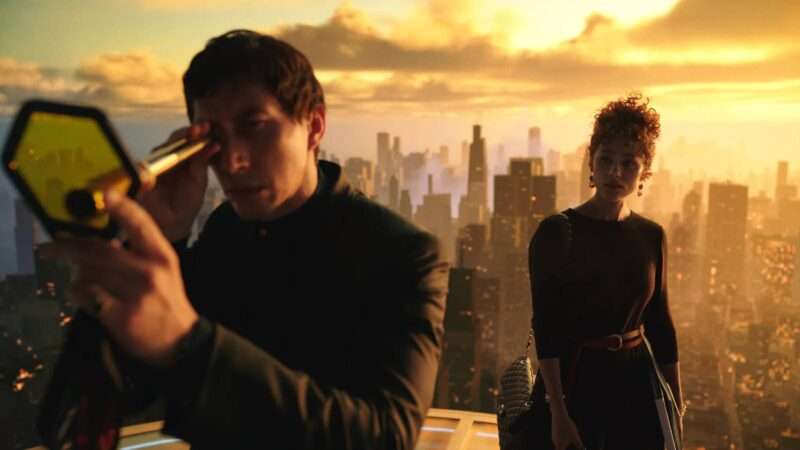
If nothing else, Megalopolis is a whole lot of movie. But not in a good way.
Francis Ford Coppola's long-gestating passion project—in development since the 1970s—is a movie of sprawling ambition: Megalopolis gestures at ideas and concepts ranging from cultural decay to public debt to architecture to zoning. It's a movie about the slow, sad death of a once-great republic. Yes, Coppola, the director of The Godfather, still believes in America. But he's not sure that America believes in itself, so he's made a movie that seems to want to take on the entire nature of art, society, and human existence, and, in the process, demand that humans reach for more.
Surely, it declares, there must be something better—something more beautiful and more inspiring, something more worthy of epochs of evolution and human struggle—than the way we live now?
If Megalopolis is any indication, the answer, sadly, is no.
The movie is ambitious, yes, but in a way that's so clumsy as to be comical. Characters speak in elliptical, pseudo-Shakespearean runes so absurdly self-serious they sound like dramatic readings of tweets. The movie's story is a thicket of opaque schemes and subplots that are nearly impossible to follow. There are striking images, but on the whole the movie's slick digital sheen makes it look like it was shot on an old iPhone. It's a movie that wants to provoke awe, but it's more likely to provoke an LOL. After watching this movie, you won't believe in a better world. You'll just be scratching your head.
Megalopolis? More like, MegaFlopThisIs.
Set in a retro-futuristic version of New York City called New Rome, the movie sometimes plays like an elaborate stunt designed to prove that, yes, men really do think about the Roman Empire all the time.
New Rome is declining, decaying, coming apart, saddled with debt and fiscal problems. Yes, this is a movie premised on problems with public finance. No surprise, then, that it makes about as much sense as a city budget hearing.
To solve New Rome's woes, brilliant architect Cesar Catalina (Adam Driver) is given a federal license to clear the old city and turn it into something new, something beautiful, which in practice means a goofy-looking, sci-fi cityscape built out of a special substance called Megalon, which can control time. (Unfortunately, it couldn't make this slog of a movie go any faster.) But Catalina has a rival in the form of New Rome Mayor Franklin Cicero (Giancarlo Esposito), who wants to build something uglier and more conventional, a city more focused on meeting people's needs now rather than making a monument that will inspire people into the future.
From this conflict emerges a city's worth of characters and subplots, often with name-brand acting talent attached: There's Nathalie Emmanuel as Cicero's beautiful daughter and Cesar's love interest; Shia LaBeouf vamping embarrassingly as Clodio Pulcher, Cesar's jealous cousin; Jon Voight as a doddering, elderly finance maven; Lawrence Fishbourne as Cesar's driver and bodyman; Dustin Hoffman as Nush Berman, a city apparatchik; and Aubrey Plaza as a vain and selfish TV personality whose name, for some reason, is Wow Platinum.
Wow. Just…wow.
What any of these characters wants in the film, or even just what they're talking about in a given scene, is often maddeningly unclear. There are complex government machinations at work that are never explained (fair enough, I suppose), as well as various family connections and personal feuds that never quite congeal into a straightforward plot.
The closest thing the movie has to a unified dramatic throughline is Cesar's quest to build his new city, but far too often, Megalopolis veers off course and off topic. At best these detours provide inspired visions of a falling republic's decadence, as in a gaudy circus event at a revamped Madison Square Garden featuring both chariot races and professional wrestlers. At worst the movie's middle hour is simply incoherent to the point where it might have been more rousing if it spent more time on the specifics of urban fiscal policy.
Megalopolis wants to be about everything, but it ends up being about very little at all.
To the extent that a clear theme emerges, it is almost inadvertently. For all its sociopolitical imagery, Megalopolis isn't really a movie about America or Rome or human nature. It's about art, ambition, and commerce in Hollywood.
Cesar is rather obviously a stand-in for Coppola: He's surrounded by visionless leaders, selfish strivers, sneering sycophants, and wheezing money men. He wants to create something grand, something impossible, something that's never been seen before, something for posterity. He understands that great artists and great visions are neither understood nor appreciated in their time, but he presses on anyway, for the sake of the future. The difference is that Coppola didn't make a city; he made a movie.
I'll say this for Coppola: The man is a genuine visionary. His 1970s filmography—two Godfather films plus The Conversation and Apocalypse Now—may well be the greatest four-movie run of any director ever. For all its on-the-nose clunkiness, his ambition is radical and praiseworthy.
But Megalopolis is a mega mess. Few will understand or appreciate it now, and I have my doubts about the future.
The post <i>Megalopolis</i> Is a Mega Mess appeared first on Reason.com.







